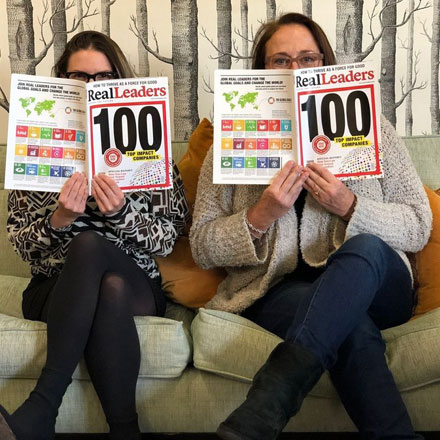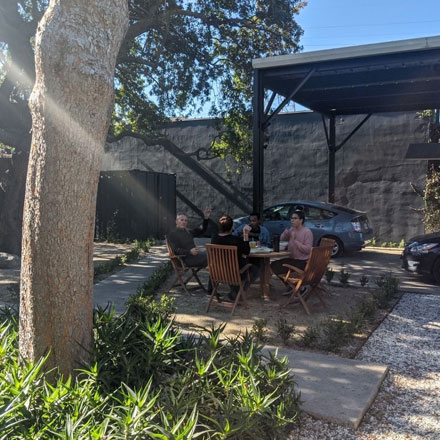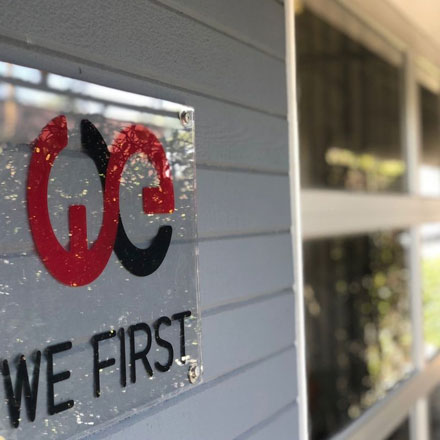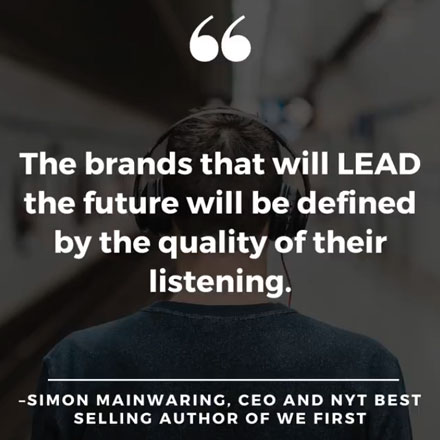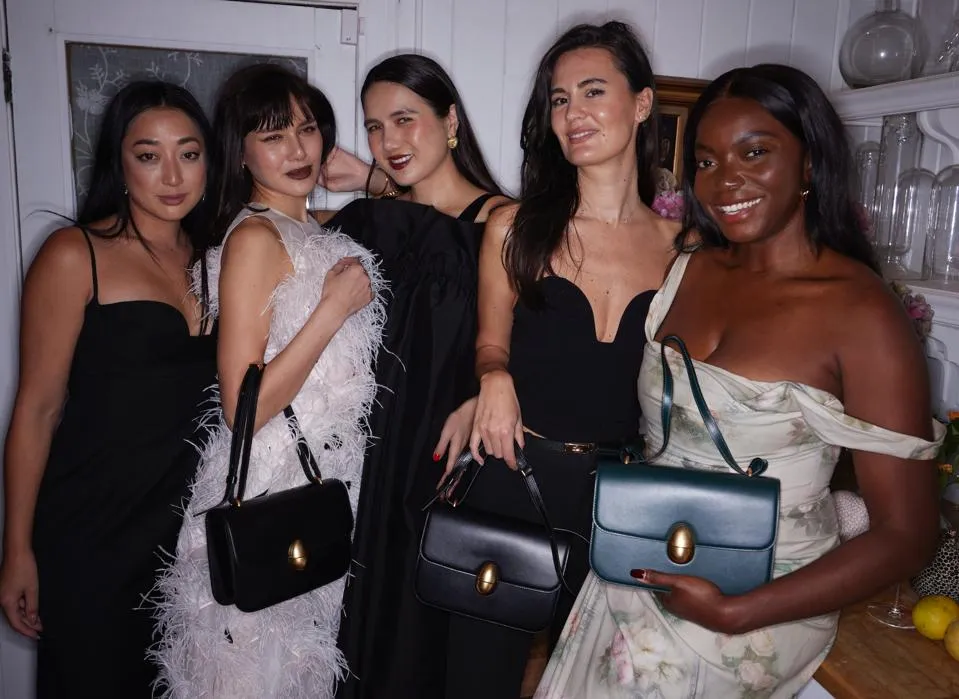
Purpose At Work
How The Olivela/Galliott Partnership Fashions A Better Future For Both Ends Of The Financial Spectrum
In 2017, entrepreneur Stacey Boyd raised nearly half a million dollars for the Malala Fund through her business venture, Schoola. Afterward, the former teacher and principal was invited to meet the Pakistani education activist Malala Yousafzai for her 18th birthday celebration.
During that trip, Boyd visited one of Kenya’s largest migrant camps, the UNHCR’s Dadaab Refugee Complex. She found herself especially affected by the narratives of girls suffering the consequences of war, poverty, and forced marriages.
Boyd reached into her “stylish” bag to find her cellphone, so she could take a picture. And she realized in that moment that “A fraction of the cost of the bag I was carrying could have sent a girl to school for a year! So, the idea was born, that combining luxury and impact might be a powerful combination.”
This was Boyd’s impetus for founding Olivela (ah-li-VAY-lah) as a luxury e-comm player with a philanthropic core, part of a new breed of retailer with giving-back built into every transaction. It began with just twelve brands and today it sells hundreds of brands in ready to wear, jewelry, bags, shoes, home, beauty, and more.
The Big Idea
“We’re driven by the philosophy that style and substance should coexist,” says Boyd. “We believe that the simple act of shopping can do real good in the world.” Specifically, a portion — 20 percent — of net proceeds on every purchase through Olivela supports one of the company’s many “cause partners.” The charitable partners variously advocate for global good in three broad areas: gender equality, health and wellness, and climate action. Olivela empowers its customers to choose a partner they wish to support with each purchase.
“Storytelling is really compelling and important,” says Boyd. “It’s why with every product you see on Olivela’s site, it’s clear what exactly your purchase of that item will do. It’ll be X number of days of school, it’ll be X hours of species conservation. That specificity, transparency really, is important for the customer. Customers know exactly what good their purchase will do”
Olivela’s impact so far is impressive, as these examples demonstrate:
- Climate Action: Supporting 50,522 of on-the-ground conservation hour initiatives with partners such as biodiversity NFP Re:Wild and Eden Reforestation Projects.
- Education: Providing 740,330 days of school for girls through partnerships with CARE, Malaika, and The Obama Foundation’s Girls Opportunity Alliance.
- Health & Wellness: Supplying 271,671 chemotherapy treatment supplies and meals for cancer patients through partners including St. Jude and Cancer Cartel.
Says Boyd, “I think what’s exciting about Olivela is that the [philanthropic] mission has been baked into our DNA from the get-go. This is not an afterthought. The contribution is baked into the actual business model, in both the way in which we work with brands and the way in which we work with our philanthropic partners. All mutually reinforce the underlying business model.”
“And, as a result of that, the better we do as a for-profit company,” says Boyd, “the better our non-profit cause partners do … because the business model was designed with that in mind.”
Big Dollars, Deep Impact
This baked-in philanthropic mission in a simultaneously successful-across-the-board business attracted Galliott Capital Advisors, which now has a stake in Olivela.
Antoine Souma is the owner and managing partner of the independent private equity and wealth advisory firm, which, since its founding in 2020, has accumulated more than $1B AUM, boasting global giants such as Elon Musk’s SpaceX and Fortnite parent, Epic Games.
Once established with such top tier clients, says Souma, Galliot was free “to be a little bit more selective. Let’s go back to what we really wanted to do.” Which was to unlock opportunities for his mostly wealthy-family clients to exert positive impact — while their investments grew. In other words, to “create value that has impact.”
Of his clients, Souma says they “want to make sure the impact grows more exponentially. So, we’re not just giving the money to a charity, and that’s it. No, we want to see this money grow.”
Which made “Olivela … in the right hands with the right leadership, with the right capital … a perfect combination for us. [Boyd] could achieve that.” Turns out, she was doing a small raise in 2023.
Souma had known Boyd since his days at Morgan Stanley, where his team was the largest investor in Olivela. The two convened in Geneva for a meeting. It was a tough time for investing by any measure. But Boyd felt confident in pitching Olivela to his private client families. It ticked a lot of boxes. “We are a globally oriented practice that understands the cultural sensibilities of our cosmopolitan clients,” says Souma.
Souma’s philosophy and strategy concerning the more controversial aspects of DEI is simple: “Basically, whoever comes in with the best idea, the best performance, we’re going to invest, whether it’s Black, or white, or Asian American, it doesn’t matter. Whether it’s a female, or it’s a male … it just doesn’t matter. I just want the right idea. [I want to] expand that circle, bring in everyone. Whoever has the best idea, we’ll invest in it. When it came to Olivela, it was the best idea.”
Of the idea, Boyd stresses that “people won’t buy a bag simply because it sends a girl to school. They will buy a bag because they love it, and they’ll buy a bag from us versus somebody else, because it’s a bag they love and it sends a girl to school. The company has garnered several celebrity endorsements, including from Jennifer Aniston, featured in InStyle, who came into the fold through St. Jude.
“I fundamentally believe that people want to do the right thing, and that’s what we’ve seen in terms of Olivela’s growth,” says Boyd. “The combination of buying something you love while also nudging the world a little is quite compelling.”
But, from Souma’s side, his fiduciary responsibility doesn’t require the give-back model at the heart of Olivela’s ethos. In fact, his investors tend to live outside the US, and are therefore less inclined toward charitable giving outside their own families and communities, he says. In other words, the business case has to work:
“We’re approaching Olivela as an investment proposition, not as a charity, or donation, or a philanthropic project. It’s not. This is an investment that at the same time is going to contribute to the wellbeing of someone else other than you, bottom line,” Souma says. So while Olivela champions self-expression and considers “great style one of life’s greatest achievements,” the Olivela-Galliot partnership proves that what you wear and carry, and what you stand for, can be stitched together extraordinarily well.


